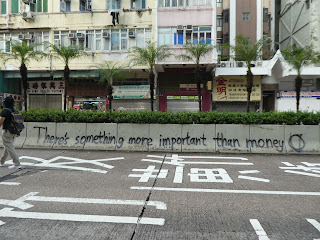How many Hong Kong protestors perceive China
If only more people felt this way...
Human Rights Watch launched its 2020 global report
at the United Nations headquarters in New York yesterday. The
international non-governmental organization (NGO) was originally
scheduled to launch its 30th annual review of human rights practices
around the world in Hong Kong today but changed the report's launch venue and date after its executive director, Kenneth Roth, was denied entry to Hong Kong on Sunday.
The
Hong Kong immigration officer who barred Roth from entering Hong Kong
told him that the decision to do had come from Hong Kong. But Beijing later owned up to its being behind that decision. As Roth has noted in a Tweet, "Hong Kong's Basic Law (its mini-constitution) gives the Hong Kong
government "full autonomy on immigration control matters." In barring me
from entering, Beijing just flouted that key element of "one country, two systems."
As it so happens, the lead article in Human Rights Watch's World Report 2020 is entitled "China's Global Threat to Human Rights".
It is currently available in its full form in English, Chinese, Arabic,
French, German, Spanish, Portuguese and Russian. I have a feeling
though that, due to its length, not as many people will plough through
it as would be ideal. So here's picking out a few key paragraphs and
sentences that I think are worth reading, at the minimum:-
China’s government sees human rights as an existential threat. Its
reaction could pose an existential threat to the rights of people
worldwide.
The motivation for Beijing’s attack on rights stems from the fragility
of rule by repression rather than popular consent. Despite decades of
impressive economic growth in China, driven by hundreds of millions of
people finally emancipated to lift themselves out of poverty, the
Chinese Communist Party is running scared of its own people.
The conventional wisdom once held that as China grew economically, it
would build a middle class that would demand its rights... Few today believe that self-serving rationale, but most governments
have found new ways to justify the status quo. They continue to
prioritize economic opportunities in China but without the pretense of a
strategy for improving respect for the rights of the people there.
If every government alone faces a choice between seeking Chinese economic opportunities and speaking out against Chinese repression, many will opt for silence. But if governments band together to address China’s flouting of human rights, the power balance shifts.
By the same token, companies and universities should draft and promote codes of conduct for dealing with China. Strong common standards would make it more difficult for Beijing to ostracize those who stand up for basic rights and freedoms.
Unless we want to return to an era in which people are pawns to be manipulated or discarded according to the whims of their overlords, the Chinese government’s attack on the international human rights system must be resisted. Now is the time to take a stand. Decades of progress on human rights are at stake. (My emphasis.)
If every government alone faces a choice between seeking Chinese economic opportunities and speaking out against Chinese repression, many will opt for silence. But if governments band together to address China’s flouting of human rights, the power balance shifts.
By the same token, companies and universities should draft and promote codes of conduct for dealing with China. Strong common standards would make it more difficult for Beijing to ostracize those who stand up for basic rights and freedoms.
Unless we want to return to an era in which people are pawns to be manipulated or discarded according to the whims of their overlords, the Chinese government’s attack on the international human rights system must be resisted. Now is the time to take a stand. Decades of progress on human rights are at stake. (My emphasis.)


No comments:
Post a Comment